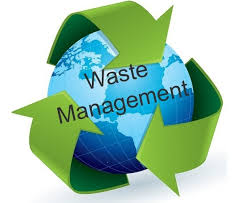Waste management is an important and necessary function since industrial revolution. Waste management is the control of redundant materials.
This includes:
- Collection of waste matter.
- Transportation of Waste matter.
- Sorting on the basis of size, disposal conditions and its affects.
- Recycling.
- Clearance.
- Disposal of waste materials.
Waste management may include radioactive substances can be in solid, liquid, or gaseous state. Waste management is normally concerned with the materials produced by actions of humans, and unless managed efficiently may have adverse effects on the environment and health of the community. It is an important and complex process due to the multiple varieties of waste produced by industry, each producing different types of materials that require special management techniques.
Techniques of Waste Disposal
- Landfills
- Incineration
- Recycling
Landfills:
Landfill is economical and most common system of waste disposal. This involves the burial of waste materials inside the earth surface. Not properly designed or managed landfills may create environmental hazards and diseases. This may also lead to dispersion of garbage by wind and other similar reasons. Generally, unused pits located far away distance from the developed areas are preferred as to avoid harmful effects. Land filled waste gets reduced in size by compaction. Landfills may also include systems for the extraction of gas that is used for the cooking, generation of electricity and other purposes. Landfills should not pollute the surface water or the ground water as Leakage from landfill wastes can be minimized by solidification using cement or asphalt.
Incineration:
Incineration is the method to eliminate the solid, liquid, and gaseous waste. In the process burning of waste takes place that releases hazardous air contaminants. This may leads to serious public concerns regarding environmental pollution. Due to incomplete combustion in an incinerator the gaseous emissions contain micro-pollutants. This dis-advantage makes the technique not safe for the area near the incinerator. Mostly used where space for landfills are not available.
Recycling:
Recycling is the most ideal way of managing waste. Recycling can be costly and difficult to implement. The products like aluminum, steel cans, glass bottles, paper and etc can be easily recycled. Recycling saves money and resources as well as less pollutant to environment.
Click here for government certifications





7 Comments. Leave new
Well explained!
Good effort!
wonderful post!!!
Wow… Most relevant topic and you explained it so well!!
Recycling of resource are very much needed as of now :D. As we are steping fast to the future their are more chances that our resources get limited day by day 😀
Also the Landfills is a good procedure of waste management but 🙁 after some time it will give lots of cons from the pros 🙁
Good work 😀 by putting such an important article 😀
Must read
informative
waste is the serious issue. Well brought into light.